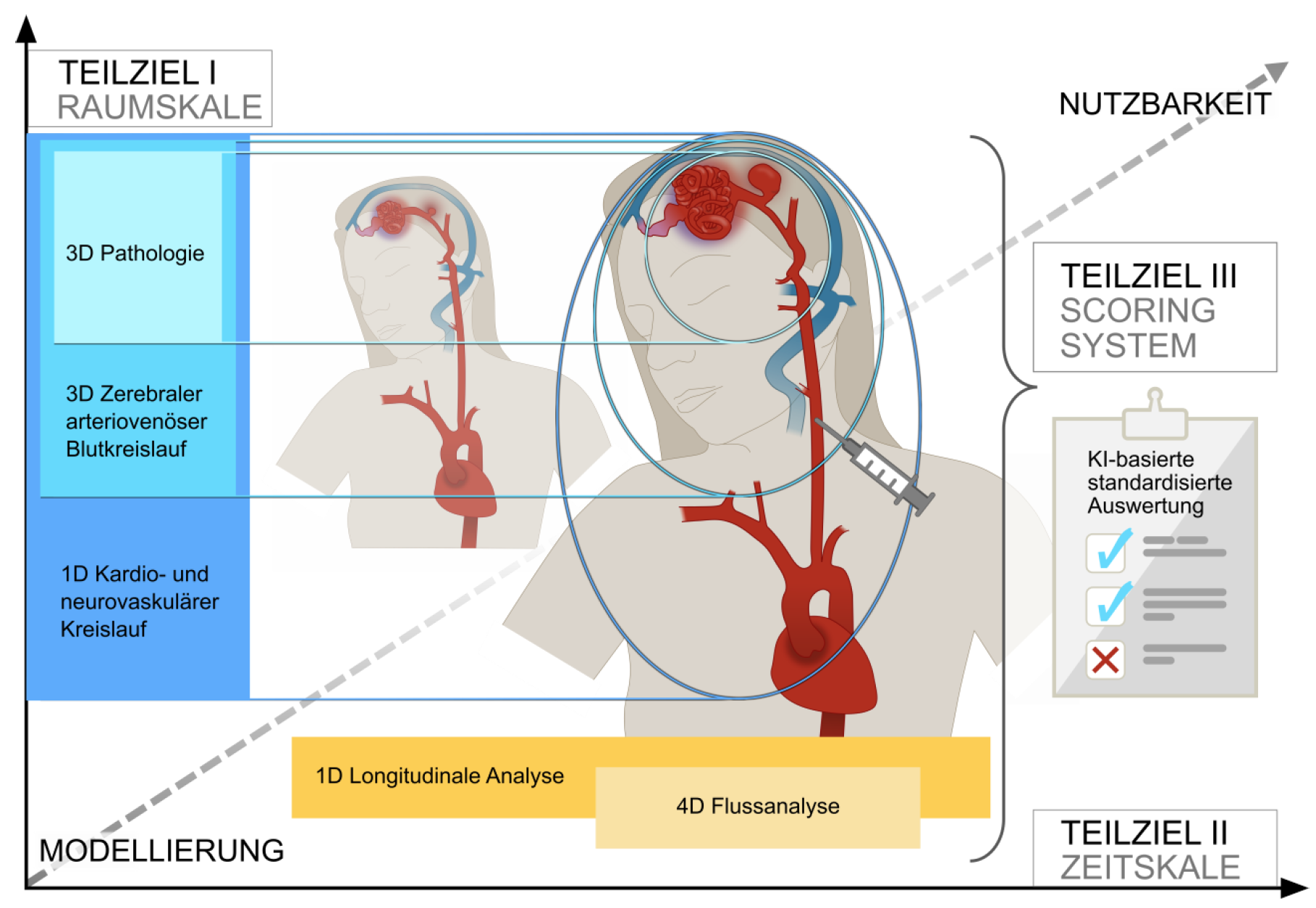NEWS
Successful completion of SCALE project: AI-supported assessment of neurovascular pathologies
The Computational Medicine research group at the Research Campus STIMULATE has successfully completed the SCALE research project – cross-scale coupling of vascular haemodynamics for AI-based, standardised evaluation of neurological pathologies.
The background to the research project was neurovascular diseases, which are among the most common causes of death in Germany and can lead to severe limitations and disabilities. These include patient-specific pathologies of the cerebral vessels, such as intracranial aneurysms or arteriovenous malformations. Despite modern imaging techniques, the individual risk assessment of these diseases is complex and often simplified in everyday clinical practice, which makes it difficult to choose the optimal therapies.
The SCALE project pursued an innovative approach: first, cardiovascular haemodynamics were described using one-dimensional models, before the neurovascular circulation and venous system were mapped in three dimensions using numerical fluid mechanics. In this way, pathologies could be precisely characterised morphologically and haemodynamically, and their growth and remodelling processes could be tracked over time with the aid of computers.
Following the successful implementation of modelling ‘from the aorta to the vein,’ a usability module was developed to standardise the in silico models. At the same time, high-resolution in vitro validation measurements enabled the plausibility of the models to be checked. Finally, the results were transferred to a scoring system for clinical application.
An essential component of the project was the combination of multi-scale modelling approaches and the use of artificial intelligence: deep learning methods accelerate image- and model-based pre-processing and the evaluation of flow simulation, while machine learning methods enable automatic evaluation of the extracted parameters.
SCALE was carried out as a sub-project of the DFG Priority Programme SPP 2311 ‘Robust coupling of continuum biomechanical in silico models for active biological systems’ and delivers a holistic approach to the evaluation of neurovascular pathologies. The transfer of these findings into a standardised evaluation system opens up the possibility of a precise and low-risk assessment of the individual disease state.
Image: Schematic representation of the various spatial and temporal scales of modelling vascular pathologies addressed in the project.
Bild: Schematische Darstellung der verschiedenen im Projekt adressierten Raum- und Zeitskalen der Modellierung vaskulärer Pathologien.
STIMULATE beim Tag der offenen Tür im Bundesministerium für Forschung, Technologie und Raumfahrt in Berlin
Die Forschungsgruppe Computational Medicine aus dem Forschungscampus STIMULATE hat erfolgreich das Forschungsprojekt SCALE – Skalenübergreifende Kopplung vaskulärer Hämodynamik zur KI-basierten, standardisierten Evaluation neurologischer Pathologien abgeschlossen.
Den Hintergrund des Forschungsvorhabens bildeten neurovaskuläre Erkrankungen, die zu den häufigsten Todesursachen in Deutschland gehören und zu schwerwiegenden Einschränkungen und Behinderungen führen können. Dazu zählen patientenspezifische Pathologien der Hirngefäße, wie intrakranielle Aneurysmen oder arteriovenöse Malformationen. Trotz moderner bildgebender Verfahren ist die individuelle Risikobewertung dieser Erkrankungen komplex und im klinischen Alltag oft vereinfacht, was die Wahl optimaler Therapien erschwert.
Das SCALE-Projekt verfolgte einen innovativen Ansatz: Zunächst wurde die kardiovaskuläre Hämodynamik mittels eindimensionaler Modelle beschrieben, bevor die neurovaskuläre Zirkulation und das venöse System dreidimensional unter Anwendung numerischer Strömungsmechanik abgebildet wurden. Auf diese Weise konnten Pathologien präzise morphologisch und hämodynamisch charakterisiert und ihre Wachstums- sowie Remodellierungsprozesse zeitlich computergestützt nachverfolgt werden.
Nach erfolgreicher Umsetzung der Modellierungen „von der Aorta bis zur Vene“ wurde ein Nutzbarkeitsmodul entwickelt, um die in-silico Modelle zu standardisieren. Parallel dazu ermöglichten hochaufgelöste in-vitro Validierungsmessungen die Plausibilitätsprüfung der Modelle. Abschließend erfolgte die Überführung der Ergebnisse in ein Scoring-System zur klinischen Anwendung.
Ein wesentlicher Bestandteil des Projekts waren die Kombination mehrskaliger Modellierungsansätze und der Einsatz von Künstlicher Intelligenz: Deep-Learning-Methoden beschleunigen die Bild- und Modell-basierte Vorverarbeitung sowie die Auswertung der Flusssimulation, während Machine-Learning-Verfahren eine automatische Bewertung der extrahierten Parameter ermöglichen.
SCALE wurde als Teilprojekt des DFG-Schwerpunktprogramms SPP 2311 „Robuste Kopplung kontinuumsbiomechanischer in silico Modelle für aktive biologische Systeme“ durchgeführt und liefert im Projektergebnis einen ganzheitlichen Ansatz zur Bewertung neurovaskulärer Pathologien. Die Übertragung dieser Erkenntnisse in ein standardisiertes Bewertungssystem eröffnet die Möglichkeit einer präzisen und risikoarmen Einschätzung des individuellen Erkrankungszustands.